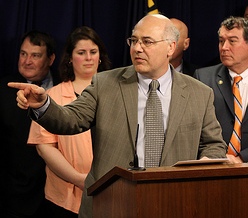Sweet Cakes by Melissa Closed Its Doors and Became “Home Business,” But Oregon’s Bureau of Labor and Industries Will Continue Investigation Into Discrimination Against Same Sex Couple.
2007 anti discrimination law does not provide for any exceptions based on personal religious beliefs.

The Gresham bakery that made international headlines earlier this year for refusing to bake a wedding cake for a lesbian couple has closed its Gresham brick-and-mortar operation in the face of an ongoing investigation by the Oregon Bureau of Labor and Industries and a vicious retaliatorycampaign of intimidation by gay-rights activists. Unfortunately for the bakery’s owners, Aaron and Melissa Klein, merely closing up shop and relocating to a home-based business will not halt the BOIL investigation. Nor will moving home likely stop the emails and telephone threats which so far have expressed desire for one or more of the Klein’s five children to fall ill and for Aaron Klein to be shot and raped.
At the heart of the controversy is a BOLI complaint filed by Rachel N. Cryer of Southeast

Portland against Sweetcakes by Melissa, apparently a sole proprietorship (more on that later), alleging a violation of ORS 659A.403(1) and 659A.409, which makes it illegal in Oregon to discriminate in the selling of goods or provision of services on the basis of, among other things, sexual orientation.
Based on the results of a similar BOLI case involving a downtown Portland bar, the bakery’s owners, Aaron and Melissa Klein, will almost surely be found in violation of this relatively new statute and face fines, penalties and damages that can easily reach six figures. Making matters worse for the Kleins is that because of the nature of their business structure, they may be personally liable for these damages, which could spell financial ruin for the young Christian family of seven who live in Sandy, Oregon.
During the 74th legislative session in 2007-2008, Democrats owned an 18-12 advantage in the senate and held a narrow 31-29 edge in the house. Those numbers, along with a sympathetic Democratic governor, provided gay rights supporters with their best opportunity in the post-Oregon Citizens Alliance years to pass a statewide law recognizing sexual orientation as a protected class. In 2007, then state Senator Brad Avakian (D) helped lead the passage of SB 2, “relating to sexual orientation discrimination,” otherwise known as the “Oregon Equality Act of 2007.” Today, Avakian is Oregon’s elected Labor Commissioner and as such, commands the Bureau of Labor and Industries, which been busy lately enforcing the OEA’07 relating to sexual orientation discrimination claims.
As introduced in 2007, SB 2 added to the list of protected classes in Oregon “sexual orientation,” which “means an individual′s actual or perceived heterosexuality, homosexuality, bisexuality or gender identity, regardless of whether the individual′s gender identity, appearance, expression or behavior differs from that traditionally associated with the individual′s sex at birth.”
On its third reading, SB 2 was carried by Sen. Avakian and passed the state senate, 21-7, with two excused. All seven nay votes were Republicans, while four GOP senators – Frank Morse, Fred Girod, David Nelson and Jackie Winters – voted with the Democrat majority. SB 2 then went to the house, where it was amended to provide an exemption from the Act for “a bona fide church or other religious institution.” Notably, this amendment did not provide for an individual exemption based on that individual’s personal religious beliefs. SB 2 passed the house with amendments, 35-25, with four GOP members – Vicki Berger (Salem), Bob Jenson (Pendleton), Chuck Burley (Bend) and John Dallum (Hood River) – joining all 31 Democrats.
SB 2 sailed through the senate with the house amendments on a 19-7 vote, was signed by Governor Kulongoski on May 9, and became Oregon law on January 1, 2008. It took five years before the first major BOLI case involving sexual orientation was complete, and the news does not bode well for the Klein family.
P-Club and the T-Girls

In August 2012, Avakian’s Civil Rights Division launched an investigation into a North Portland bar known then as the Portsmouth Club or P Club, and its owner Christopher Penner, which were accused of violating the Oregon Equality Act by telling a group of transsexuals, known as the Rose City T-Girls to stay out of his bar because he was losing money when other patrons thought the P Club was a “tranny bar” or “gay bar.” It took BOLI only two months to conclude its investigation, finding “substantial evidence that the bar, through owner Chris Penner, sought to keep a group of transgender patrons out of the establishment based on their gender identity.”
With the investigation complete, Avakian then filed formal charges against the P Club and Penner through his Administrative Prosecution Unit or APU. A hearing was held in May 2013 before an administrative law judge, who also is employed by BOLI. Not surprisingly, the BOLI-employed ALJ found against the P Club and Penner and ordered Penner to pay 11 members of the T-Girls a total of $400,000 in compensation for their troubles. While Penner apparently remains in business today, he has since changed the name of his establishment from the P Club to The Twilight Room Annex.
Meanwhile in East Multnomah County, a commercial vacancy exists where a small business once stood and a hard working family faces potential bankruptcy over a same sex wedding cake if and when Avakian drops his BOLI hammer on them.
Sweetcakes by Melissa
The facts of this case are really not in dispute. On January 13, 2013, Rachel Cryner and her same mother entered Sweetcakes by Melissa in on NE Division Street in Gresham. Cryner and her mother met with owner Aaron Klein to order a wedding cake. Klein asked the names of the bride and groom and the women replied there would be no groom, but two brides. Klein told the women the bakery does not make wedding cakes for same-sex couple planning, citing his personal religious beliefs. Klein later told the media that the bakery does not otherwise discriminate against gay patrons, but draws the line at baking a wedding cake for same-sex couples.
Cryner filed her BOLI complaint on August 8, 2013, almost a year to the day after the P Club complaint was filed. Given the previous time line, the Klein’s can expect the BOLI investigation to be complete by October at the latest. And the findings will not be favorable to the Kleins.
Based on a strict reading of the OEA’07, Sweetcakes by Melissa appears to meet the broad definition of a “place of public accommodation,” which is defined as, “any place or service offering to the public accommodations, advantages, facilities or privileges whether in the nature of goods, services, lodgings, amusements or otherwise.” The Kleins openly admit the bakery does not make wedding cakes for same sex weddings, but also insist they sell every other product to anyone, regardless of sexual orientation. It will not be difficult for the BOLI investigators to find “substantial evidence” that the bakery refused to sell a wedding cake to a lesbian couple.
No Religious Exemption
Although Aaron Klein cites his personal religious beliefs as the basis for refusing to make a same-sex wedding cake, Oregon law as expressed in the OEA’07 does not provide for an individual religious belief exemption to complying with the law. As noted above, when SB 2 moved from the senate to the house, it was amended to include an exemption for a “bona fide church or religious institution.” But even that exemption only applies “to housing or the use of facilities based on a bona fide religious belief about sexual orientation as long as the housing or the use of facilities is closely connected with or related to the primary purposes of the church or institution and is not connected with a commercial or business activity that has no necessary relationship to the church or institution.”
In other words, Oregon law presently does not require a church to provide the use of its facilities for same sex weddings (which are not legal in Oregon anyway – yet). However, if a church or religious institution operates a commercial or business activity, such as a thrift store, the religious exemption may not apply. But more importantly, the OEA’07 provides no religious exemption for individuals.
Closing Business Does Not Close Investigation
The fact that the Kleins are shutting down their store front business and reportedly re-locating to a solely home-based business will not shut down the BOLI investigation. Furthermore, it is not clear what kind of business entity Sweetcakes by Melissa actually is. According to the Corporation Division, “Sweetcakes by Melissa” is a registered Assumed Business Name in Multnomah, Clackamas and Washington counties, with Aaron Klein as the authorized representative and Melissa Klein as the registrant and owner. It appears the bakery is either a sole proprietorship or general partnership, which means the individual owner(s) are personally liable for all company debts, without the limited liability protection offered by a corporation or limited liability company (LLC).
While the $400,000 P Club BOLI award should give the Kleins reason for concern, such financial ruin is not a guaranteed outcome. Once the BOLI investigation in complete, there is an opportunity for BOLI to reach a negotiated settlement between the parties. Such agreements can often include a money award, a promise to do or not do something, or a combination thereof. Given the fact that in these types of contested case hearings, in which the case manager, chief APU prosecutor and ALJ hearing the case are all employed by Avakian, the Kleins have little chance of prevailing at the contested case stage.
Possible Defense and Appellate Arguments

The Sweetcakes case presents an interesting legal argument in that, while on the surface the Kleins appeared to violate the OEA’07 by refusing to make the same sex wedding cake, they in fact refused to participate in an act that at present is not lawful in Oregon. Unlike the complainants in the P Club case, the Kleins are not alleged to have told gay and lesbian customers they may not enter or shop at Sweetcakes by Melissa, nor have the Kleins refused to sell their products to any protected class – with one singular exception. Whether the BOLI staff, including the ALJ, agrees or not is doubtful. But consider the following hypothetical case.
Five members of a religious sect that practices polygamy – one man and four women – enter the bakery. The man tells the owner he wants a wedding cake to celebrate his pending marriage to all four of the women, who he lists as brides. The baker tells the man he and his companions are welcome to purchase anything in the store, but the baker will not make a wedding cake for a marriage act that not only violates the baker’s personal religious beliefs, but is not lawful in Oregon, which does not recognize plural marriages.
On its face, the baker has violated the OEA’07 by discriminating against the five customers, based on their religion, which is a protected class. But can the OEA’07 compel a “place of public accommodation” to participate in an act that is not lawful in Oregon? While there is no current Oregon case deciding that issue, a recent New Mexico Supreme Court case does not bode well for the Kleins on that theory, either.
Wedding Photographers, also
The New Mexico case involved wedding photographer Elane Huguenin, co-owner (with her husband) and chief photographer for Elane Photography LLC, who refused to participate in a same sex wedding based on her personal religious beliefs. Like Oregon, New Mexico has both an anti-discrimination statute that includes sexual orientation and a BOLI-like state agency to process complaints. Also like Oregon, the Land of Enchantment did not recognize same sex marriage, a fact that made no difference in the case. The New Mexico Human Rights Commission ruled against the photographer and fined her $7,000. She appealed and the case landed before the state’s highest court.
The New Mexico court ruled unanimously against Elane Photography, LLC, holding that the wedding business was a place of public accommodation, Elane had refused to provide its services to a couple based on their sexual orientation and that the New Mexico statute (like Oregon’s) provided no exemption for an individual’s personal religious beliefs. In a sobering concurring opinion in the case, Justice Richard C. Bosson specifically had this to say to and about the Huguenins:
“The Huguenins today can no more turn away customers on the basis of sexual orientation—photographing a same-sex marriage ceremony—than they could refuse to photograph African-Americans or Muslims. All of which, I assume, is little comfort to the Huguenins, who now are compelled by law to compromise the very religious beliefs that inspire their lives. Though the rule of law requires it, the result is sobering. It will no doubt leave a tangible mark on the Huguenins and others of similar views…
“The Huguenins are free to think, to say, to believe, as they wish; they may pray to the God of their choice and follow those commandments in their personal lives wherever they lead. The Constitution protects the Huguenins in that respect and much more. But there is a price, one that we all have to pay somewhere in our civic life.
“In the smaller, more focused world of the marketplace, of commerce, of public accommodation, the Huguenins have to channel their conduct, not their beliefs, so as to leave space for other Americans who believe something different. That compromise is part of the glue that holds us together as a nation, the tolerance that lubricates the varied moving parts of us as a people. That sense of respect we owe others, whether or not we believe as they do, illuminates this country, setting it apart from the discord that afflicts much of the rest of the world. In short, I would say to the Huguenins, with the utmost respect: it is the price of citizenship. I therefore concur.”
No Shirt, No Shoes, No Service?

A common response by many who have followed the Kleins’ case centers on the oft-used idea that a business “reserves the right to refuse service to anyone.” While that familiar phrase may have been commonplace a generation ago, today’s anti-discrimination laws have rendered that idea a relic of a not-so-distant past. Others cite the familiar “No Shirt, No Shoes, No Service” signs in support of the Kleins. But at least for now, being shirtless and shoeless are not stand-alone protected classes in Oregon. Replace that sign with, “No Blacks, No Jews, No Mexicans” based on the “right to refuse service to anyone” argument, and the dynamic changes. With the passage of OEA’07, one can now add the LGBT alphabet – lesbian, gay, bisexual, transgendered – to the list of persons protected from discrimination by places of public accommodation.
With an activist labor commissioner in Avakian on their side, one can expect more cases to be brought before BOLI or in civil court, claiming sexual orientation discrimination. Christian-owned businesses are particularly vulnerable to set-ups and shakedowns if they refuse to provide their services to a same sex couple or gay person, who may not sincerely want the service in the first place, but may be looking to a P Club type BOLI award.
Aaron and Melissa Klein are a Christian couple trying to support their family as hard-working, small business owners. By remaining true to their faith by not participating in a same sex wedding contrary to their sincerely-held religious beliefs, they have found themselves under the heel of the government’s boot. One thing is certain: if Brad Avakian’s BOLI does not put them out of business, the LGBT mafia likely will. After all, as New Mexico Justice Bosson reminds us: being “compelled by law to compromise the very religious beliefs that inspire [our] lives … is the price of citizenship” in today’s America.



